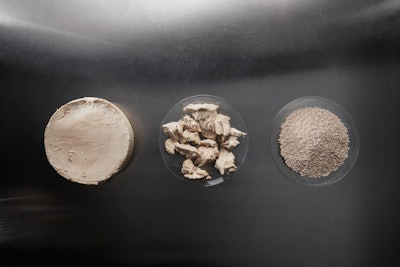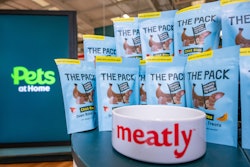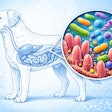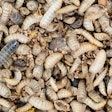
Finnish biotech company Enifer has released the results of its latest Life Cycle Assessment (LCA), determining the carbon footprint (CFP) of its proprietary mycoprotein ingredient, PEKILOPet.
With the global pet population growing and studies suggesting that the ecological footprint of cats and dogs can rival that of humans, depending on their size and diet, it’s important to consider the environmental impact of pet nutrition. The study reported that the cradle-to-gate total CFP of PEKILOPet, covering fossil, biogenic, Land Use, Land-Use Change, and Forestry (LULUC) emissions, is 0.93 kgCO₂e per kilogram of product.
In contrast, soy protein concentrate produces up to 6.7 kgCO₂e per kilogram, said Enifer. This means that PEKILOPet has 86% lower carbon emissions, equivalent to driving 46 kilometers less in an average gasoline-powered car. Enifer noted PEKILOPet also performed better than insect protein powder (1.15 kg CO₂e) and produced five times fewer emissions than high-quality dry pet food ingredients like lamb (5.84 kg CO₂e).
PEKILOPet mycoprotein is a nutrient-rich ingredient produced through a biomass fermentation process that utilizes a unique fungal strain, akin to the techniques employed in brewing or producing soy sauce. This process yields a powdery mycoprotein ingredient that is rich in protein and beta-glucan fiber, low in fat and carbohydrates, and a highly palatable and digestible source of complete protein.
The primary contributor (47%) to PEKILOPet’s emissions is the production process, including electricity and steam usage. Raw materials account for 38% of emissions, while transportation contributes 14%. The fossil CFP for PEKILOPet alone is calculated at 0.80 kgCO₂e/kg, with raw materials responsible for 45% and production processes for 38% of this total. The LULUC CFP for PEKILO is low as the production of inputs for the PEKILO production process doesn’t directly require land. The LULUC CFP for PEKILO is 0.00213 kgCO2e/kg.
“We are incredibly pleased with the results of this CFP study, which validate the environmental benefits of PEKILOPet and our production process in Kantvik, Finland,” says Enifer CEO Simo Ellilä. “The findings reinforce our mission to offer sustainable, high-protein solutions to the pet food industry and that constructing new PEKILOPet production facilities across Europe will be a significant development in our journey. PEKILOPet presents a unique opportunity to significantly lower carbon emissions while maintaining nutritional excellence.”
In 2024, Enifer secured funding for its first €33 million (US$34.3 million) production facility, set for completion by the end of 2025. Detailed engineering for the factory is nearing completion, and all major equipment has been ordered keeping the project on schedule, noted the company. At full capacity, the factory will annually convert agricultural and food industry by-products into 3,000 tons of dry, powdered mycoprotein ingredients.
Adapted from a press release.
















